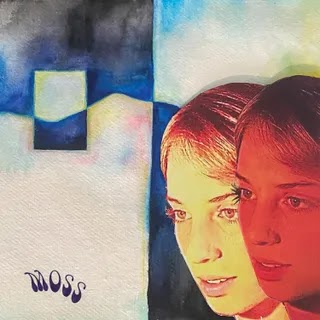The minimalist acoustic palette of the 24-year-old actor and singer’s second album makes a calming backdrop for her diaristic songwriting and white-smoke soprano.
Maya Hawke’s success in Stranger Things and recent teen dramedy Do Revenge have solidified her as a promising new presence in Hollywood, or at least on Netflix. But she’s found another foothold in understated indie folk. Hawke’s second album, Moss, the follow-up to her 2020 debut Blush, sets endearing and melancholic self-reflection against warm, drumless instrumentation. She narrates each song in a white-smoke soprano, viewing herself and others through eyes both critical and kindly.
Hawke and co-producer Benjamin Lazar Davis created the album’s intimate, insulated sound with help from Christian Lee Hutson and Jonathan Low, whose respective past credits include Phoebe Bridgers’ Punisher and Taylor Swift’s folklore. “We made sure that every sound we used on the record we used three times,” Hawke said in a recent interview. The recurring musical characters foster a sense of familiarity that’s comforting, if a bit monochromatic. The campfire-acoustic ethos doesn’t inspire much risk-taking, but the minimalist palette makes a calming backdrop for Hawke’s insights and brings her closer to forming an established identity as a musician. There’s less uncertainty in her direction now; she doesn’t, for example, attempt to emulate glam-rock swagger, as on Blush’s “Animal Enough.” Instead, Moss sticks to a diaristic indie-folk lane, a style that aligns well with Hawke’s intimate storytelling.
Throughout Moss, Hawke’s earnest, sincere lyricism interlocks the public and private, overlapping reality and fiction to reflect how she has had to negotiate both spaces in life. “All I really want is an actor of my own,” she sings on the gentle “Hiatus,” punctuating a bittersweet love story with references to Sam Shepard and the Wilhelm scream. In the wrenching “Driver,” she shares a wide-eyed plea to see her parents kiss in the back of a taxi (in real life, Uma Thurman and Ethan Hawke separated when Maya was 5). “Oh, I can watch it in the movies,” she acknowledges, but “I don’t want to see it that crafted and clear.” On the charming “Sweet Tooth,” she sings, “Saw a movie everybody hated in an empty theater in Duluth/Swear I really loved it, love is such a better thing to do.” It’s the kind of profound, obvious statement that adulthood often forces us to forget, and it rolls out as gently as a pen she’s dropped.
This industry-child introspection reveals a degree of maturity that comes through in even the simplest of premises, like the understated standout “Luna Moth.” With the help of her reliable acoustic guitar, Hawke describes how she has accidentally killed the titular creature. She apologizes; she had only come to the bathroom to cry. “I don’t need anyone to hurt me/I can do that myself,” she sings, and her airy, matter-of-fact delivery gives the impression that she’s finally voiced this thought out loud. Against a gently arpeggiating guitar that conjures the image of a dewy morning, Hawke opens “Backup Plan” by listing ordinary items: “Your pencils/Your dress socks/Your charger/Your bike lock.” It’s a seemingly innocuous series until she ties them with a ribbon: “I wanna be anything you’ve lost that you might be looking for.” The words encapsulate the feeling of offering yourself to someone (or, perhaps more importantly, to yourself), only to hope they aren’t careless with you.
As thematically complex as Moss can be, vulnerability sometimes gets lost: The spoken-word outro of “Bloomed Into Blue” feels reminiscent of college café poetry, and “Sticky Little Words” sounds almost like a rhyming exercise. Compared to the captivating “Thérèse,” where the dichotomy between representation and reality offers the album’s most vivid illustration of public versus private life, and hopeful closer “Mermaid Bar,” which tells the story of a girl who survived jumping off a bridge, these tracks don’t carry nearly as much weight. But even in the album’s less compelling moments, Hawke retains a delicate charm. She feels believable.
Correction: This review has been updated to credit Benjamin Lazar Davis as a co-producer of Moss.



0 comments:
Post a Comment